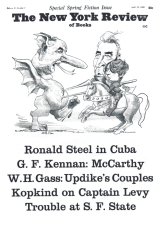In response to:
Saint Beckett from the December 7, 1967 issue
To the Editors:
Mr. Matthew Hodgart’s intelligent piece on the later Beckett (NYR, Dec. 7, 1967) reaches a conclusion much at variance with what he himself takes to be crucial evidence, the remarkable story Imagination Dead Imagine, to which he alludes twice and quotes from once. Here is Mr. Hodgart’s crucial sentence: “Beckett, despite his extraordinary intelligence, learning, and sensitivity, gives the impression of having given up asking questions, as if he no longer found anything of interest except the inner voice and pure form.” The qualifying words in this sentence and in the context are not meant to imply that this “impression” is false but only that Beckett’s earlier plays had not been crippled by such a withdrawal from life. Other works may tend to support this allegation, but not Imagination Dead Imagine.
Here is the long sentence that concludes this 1500-word story, which Mr. Hodgart calls a “fragment” but which Beckett thinks of as a novel: “No, life ends and no, there is nothing anywhere, and no question now of ever finding again that white speck lost in whiteness, to see if they still lie in the stress of that storm, or of a worse storm, or in the black dark for good, or the great whiteness unchanging, and if not what they are doing.” The transparent allusions to Joyce and Melville at the conclusion of this novel with a reversible title, i.e., 1) Imagination Dead? Imagine that! 2) Imagination Dead, you say? We must imagine, etc., point to a continuity of this little masterpiece with the great tradition of Imagination. More precisely, to refute Mr. Hodgart, there is the last phrase, which is really a challenging question, that subverts the credibility of all that has gone before: what are they doing? The variation from interrogative word order and the omission of the question mark do not really hide the overwhelming question. The data of the story, so minutely reported by the pedantic narrator, is not necessarily inert, but seems so to such a quantifying observer, who certainly does not speak for the author. The imperceptiveness of the narrator recalls a great saying of Dean Rusk, which has been variously reported: to wit, “one half the world is in darkness and half the people there are making mischief.” If not, what are they doing? There is a good chance that it is such storytellers who have killed imagination, and therefore it is we who must resurrect it.
John E. Grant
University of Iowa
Iowa City, Iowa
This Issue
April 11, 1968



